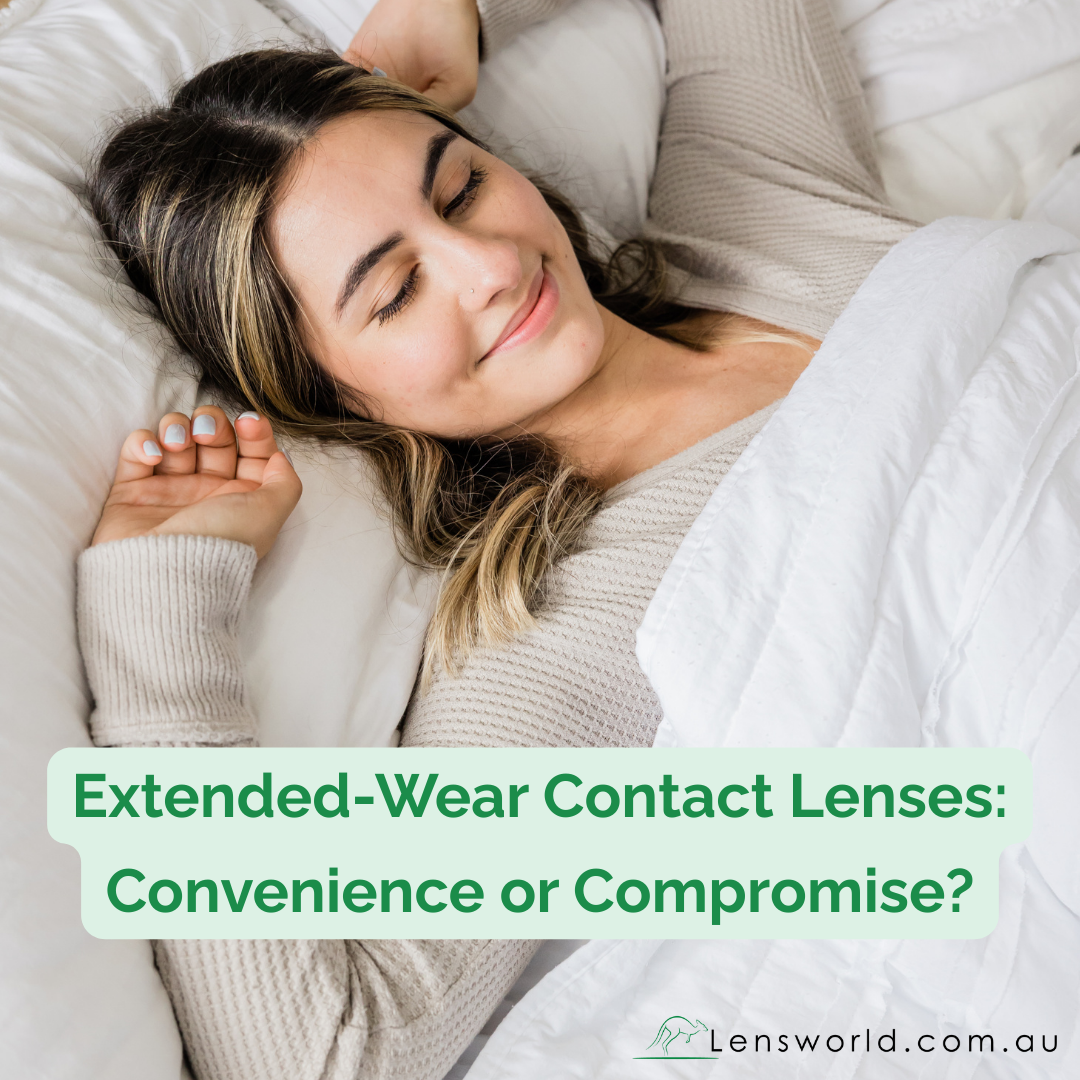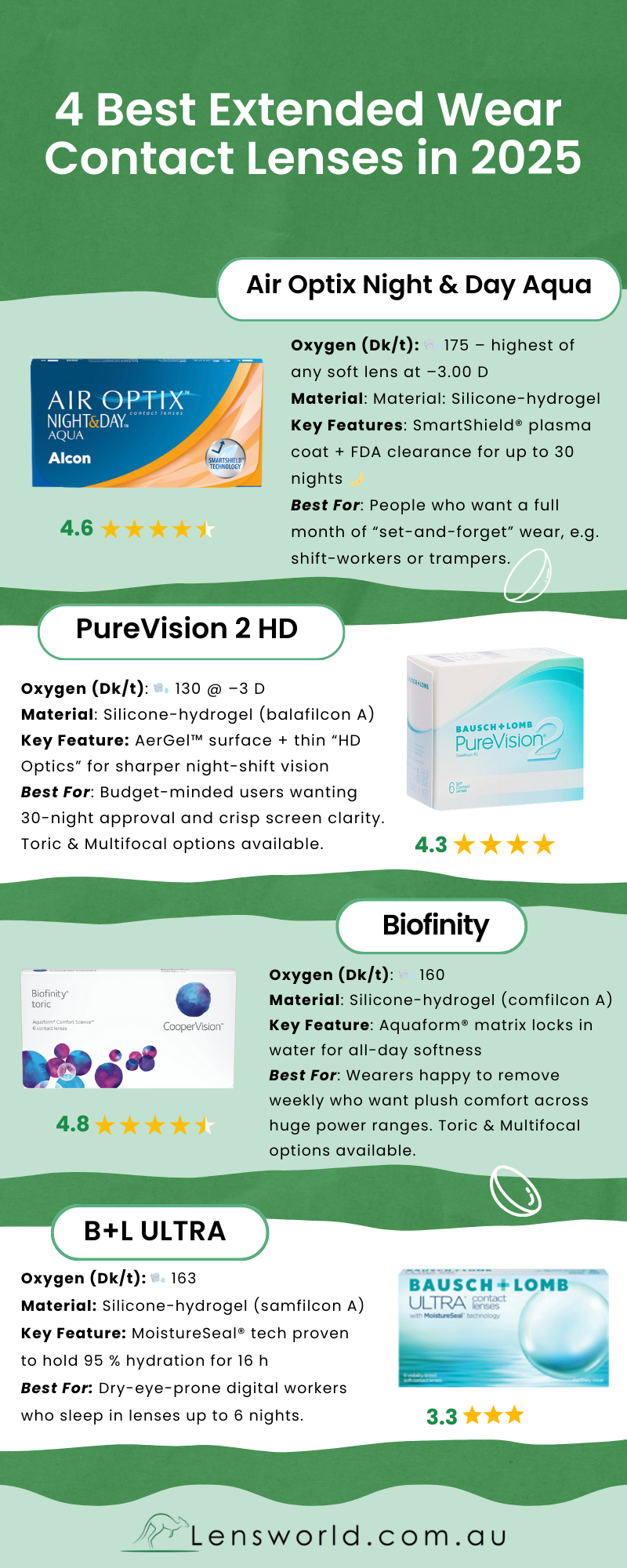Sleeping in Your Contacts: The Real Deal on Extended Wear Lenses
25th Aug 2025

Extended wear contact lenses could change your nightly routine.
Look, we’ve all been there. You’re absolutely knackered after a long day, and the thought of taking out your contacts, cleaning them, and stuffing around with cases feels like climbing Uluru. What if you could just… not?
Extended wear contacts are supposed to solve all that. Whether they actually do is another story entirely.
What are extended wear lenses, and how do they work?
Extended wear (or continuous‑wear) contact lenses are designed to stay put for days or even weeks. Some can handle up to 30 days straight—though honestly, most optometrists reckon that's pushing it. Lensworld stock the full range if you're looking to compare options and prices.
The magic happens with silicone hydrogel materials. Think of them as tiny oxygen sponges that let your eyes breathe while you sleep. Your cornea relies on oxygen to stay healthy, just as your body relies on daily fuel. Without adequate oxygen, complications can develop quickly, one of the key risks to consider with extended-wear contact lenses.
But here's where it gets interesting. Not all "extended wear" lenses are created equal. Some are approved for seven days, others for 30.
What are the best extended wear contacts in Australia?

Here's what you can actually get your hands on:
Air Optix Night & Day - The marathon runner of contact lenses. These silicone hydrogel lenses can technically go 30 days, though most optometrists suggest pulling them out weekly. They're a little pricey at around $83.95 for a six-pack, but they're also the most breathable soft lenses on the market.
Customer review – Tanya L. (Qld, Australia):
“I’ve never used any other contacts so I can not compare but I love the fact that these contacts can stay in day and night for up to a month at a time. Sometimes I need to take them out for a clean but can pop them back in and we’re good to go again…”
For comparison, see our roundup of the best monthly contact lenses in 2025.
PureVision 2 HD - Bausch + Lomb's answer to long wear. Similar oxygen levels to Air Optix, with decent comfort levels. They also do toric versions if you've got astigmatism. Expect to pay $68 for six lenses.
Customer review - Christine H. (Australia):
“Been using these lenses for about 20 years and never had a problem and this is about my 5th order from lensworld and their service is excellent, no complaints at all” - Christine H. (Australia)
Biofinity - CooperVision's offering sits somewhere in the middle for breathability but often wins on comfort. They're particularly good if you've got tricky prescriptions. Pricing varies wildly depending on your script and types—anywhere from $69 to $147.
Customer review - Jim C. (Qld, Australia)
“Love these lenses. I’ve been using them for years and buying through Lensworld because of their prices and great delivery service. Wouldn’t go anywhere else!”. - Jim C. (Qld, Australia)
Note: Biofinity’s wear schedule has changed—make sure you're aware of the latest guidelines.
Bausch + Lomb ULTRA - Only approved for seven days, but they're loaded with moisture. Good shout if you spend all day staring at screens. Around $73.95 for a six-pack.
Prices shown are indicative only - always check current listings before purchasing, as they can change.
What are the risks of wearing extended wear contacts?
Your optometrist probably won't lead with this, but sleeping in contacts increases your infection risk. Full stop.
How much? Studies show you're roughly four times more likely to develop microbial keratitis compared to daily lens wearers. That's a fancy term for "nasty eye infection that can mess with your vision permanently."
When you sleep in lenses, your closed eyelids create a warm, moist environment. Perfect breeding ground for bacteria. Add in some protein buildup on your lenses, and you've got yourself a potential problem.
But—and this is important—the absolute risk is still pretty low. We're talking maybe 4-5 cases per 10,000 people per year. It's not nothing, but it's not exactly Russian roulette either.
How do they stack up against other contact lens options?
|
Lens Type |
Pros |
Downsides |
|
Extended wear (soft) |
Super convenient, fewer changes |
Higher infection risk & corneal stress |
|
Extended wear (RGP) |
Great oxygen flow, custom fit, long-lasting |
Requires fitting and a longer wait time |
|
Hygienic, low infection risk |
More expensive over time, requires daily use |
|
|
Ortho-K (overnight reshape) |
Daytime freedom from lenses |
Still requires specialised fit and adaptation |
If you're dead set on trying them
First up—get a proper fitting. Not from an online quiz, Reddit or your mate who "knows about contacts." A real optometrist who'll check your tear film, measure your corneas, and assess whether your eyes can handle overnight wear.
Some people just aren't good candidates. Dry eyes, previous infections, or certain jobs (like working in dusty environments) might rule you out.
Once you're wearing them:
Don't push through discomfort. Your eyes feel scratchy, look red, or your vision's gone wonky? Take them out immediately. Extended wear lenses aren't supposed to hurt.
Water is the enemy. Swimming pools, hot tubs, showers—keep your lenses away from all of it. Tap water contains nasties that can cause serious infections.
Follow replacement schedules religiously. Monthly means monthly, not "when I remember" or "when they feel gross."
Keep backup glasses handy. Sometimes you'll need to give your eyes a break, and fumbling around blind isn't fun.
The straight truth
Extended wear lenses work wonders for some people. If you're disciplined about hygiene, have healthy eyes, and see your optometrist regularly, they can genuinely improve your quality of life.
They require commitment, regular check-ups, and accepting a slightly higher risk of complications.
Most optometrists will start you on weekly removal rather than the full 30-day approved wear time. It's a sensible compromise—you get most of the convenience with significantly less risk.
The real question isn't whether extended wear lenses are "safe"—it's whether the convenience is worth the trade-offs for your particular situation. Only you can make that call.
Just make sure you're making it with all the facts and chat options with your optometrist.
References:
- https://coopervision.com/about-contacts/extended-wear-contact-lenses
- https://en.wikipedia.org/wiki/List_of_soft_contact_lens_materials
- https://www.bausch.com/products/contact-lenses
- https://www.bausch.com.au/contact-lenses/monthly-contact-lenses/ultra-monthly